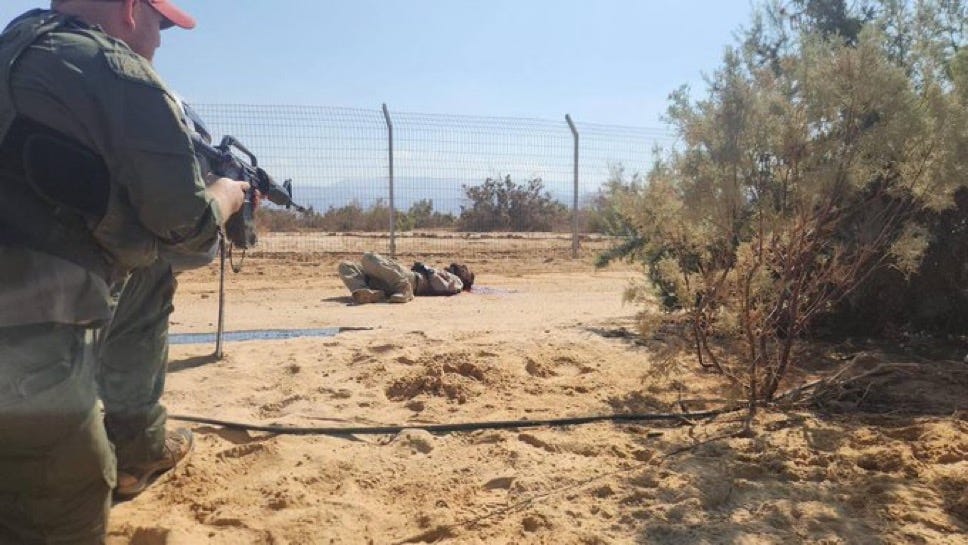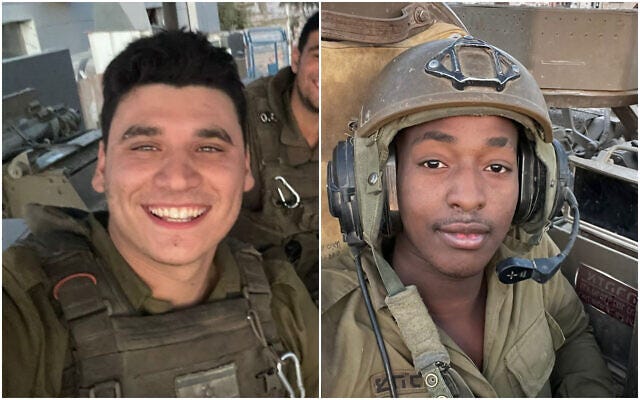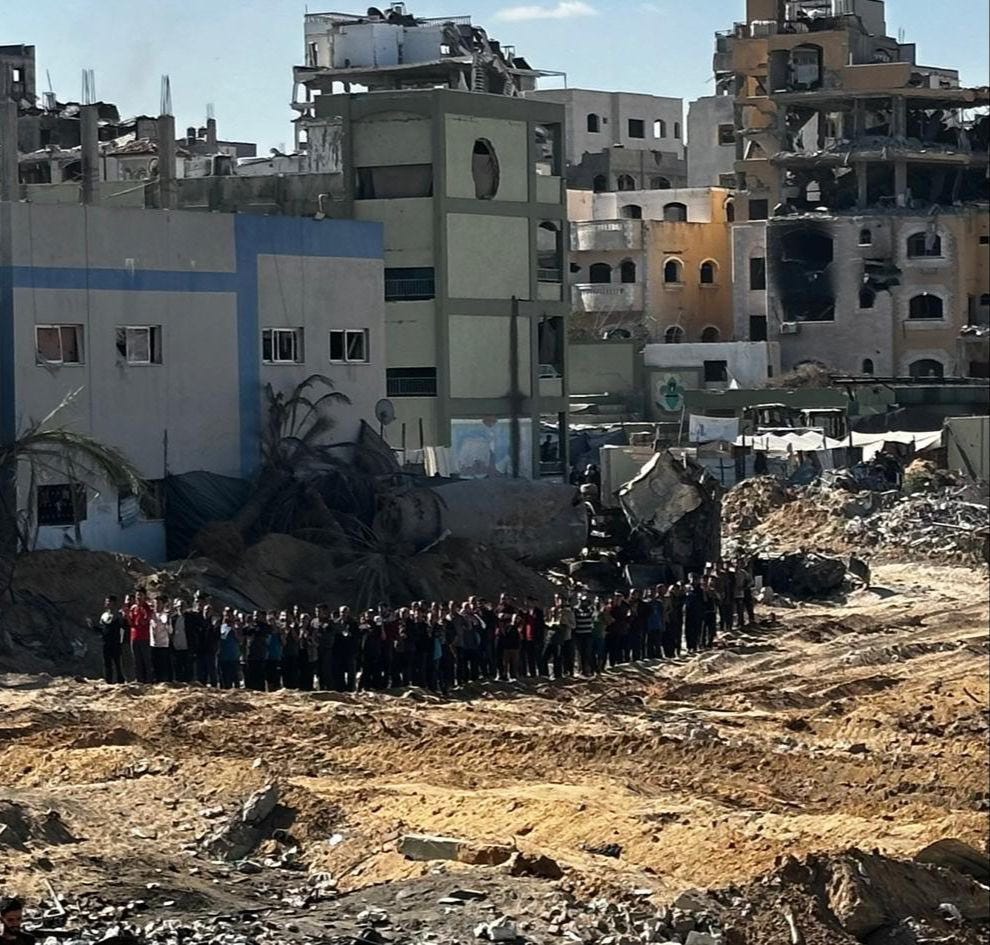DAY 379 OF THE WAR: Hezbollah Targets Netanyahu’s Caesarea Home with Drone; Two Soldiers Killed in Gaza, Soldier Succumbs to Wounds From Fighting In Lebanon, Man Killed in Rocket Attack on Akko
Tel Aviv Diary October 19, 2024
Next ZOOM Briefing
Sunday, October 20th, 6 PM Israel Time • 4 PM GB • 11 AM EDT • 8 AM PDT.
Invitations will go out in the morning.
∞–––––∞–––––∞–––––∞–––––∞–––––∞–––––∞–––––∞–––––∞–––––∞–––––∞
For a brief moment on Thursday, it seemed the war might be approaching its end with Sinwar's death. However, the events of the past two days should dispel any such notion.
On Friday morning, border patrol units detected men crossing the Jordanian border just south of the Dead Sea. They alerted the rapid response team, which was immediately deployed to intercept them. Upon arrival, the terrorists, who were dressed in military uniforms, opened fire on the responding troops. Two soldiers were wounded—one lightly and one more seriously. The two terrorists were eliminated.
Initially, there was concern that the attackers might have been Jordanian soldiers, however, an investigation confirmed they were not. Persistent reports suggest that Iran is trying to expand its influence in Jordan and destabilize the monarchy. It is hoped that this incident does not herald a series of further terrorist attacks originating from Jordan. The border area is not well-fenced, and Israel relies heavily on surveillance and rapid response teams for its security. Fortunately, the system proved effective on Friday.
Saturday began with a successful drone attack on Caesarea, seemingly aimed at Prime Minister Netanyahu's private residence. The Prime Minister’s office issued an official statement alleging that Hezbollah orchestrated the strike, though no official confirmation of the residence being hit has been provided. However, The restricted access to the house and the absence of any visual evidence suggest that the residence may have indeed been struck. Had the house not been hit, it seems probable that the government would have furnished proof to the contrary.
The successful flight of a Hezbollah drone to Caesarea without interception or prior warning represents a significant security failure for Israel. This incident is particularly alarming following last week’s deadly attack at the Golani base, which was executed in nearly the identical manner. During a rocket attack, Hezbollah launched three drones; while two were intercepted, the third avoided detection, traveling along the coast before turning inland towards what seemed to be Prime Minister Netanyahu's residence in Caesarea. Reports indicate that the Netanyahus were not in the residence at the time of the strike.
IN THE NORTH
In addition to the attack on Caesarea, Saturday saw heavy rocket fire in the North. In Akko, Alexi Popov, 51, from Kiryat Haim, was killed when a rocket struck his car after he had pulled over to the roadside. Shrapnel from the blast struck the vehicle, killing him and injuring another passenger. Further rocket attacks on Kiryat Ata, Kiryat Bialik, and Shlomi caused damage to buildings and vehicles in all three towns, resulting in a total of ten injuries.
IN GAZA
Intense clashes have erupted in Gaza over the last two days. On Friday, three soldiers from the elite Egoz combat unit sustained injuries due to accidental tank fire. Today, two soldiers were killed by an anti-tank missile in Jabalya in northern Gaza. They were: First Sergeant Ofir Berkovich (20) and Sergeant Elishai Young (19).
According to the IDF, today marked the first significant movement of Gazans from Jabalya heading further south.
Here's a summary of other events in Gaza over the last two days, based on details provided by the IDF Spokesman:
Israeli forces have continued their operations across the Gaza Strip. In the Jabalya area, the Givati Brigade combat team joined Division 162’s expanded operations, resulting in the elimination of dozens of terrorists through close encounters and airstrikes. Meanwhile, in the Rafah area, the Nahal Brigade combat team eliminated two terrorist squads that posed a threat to their forces, while the Bislah combat team engaged and neutralized armed terrorists in a separate firefight.
The Israeli Air Force has actively supported ground operations and conducted independent strikes. They attacked approximately 150 targets in Gaza, including weapons depots, launch shafts, and observation posts. In central Gaza, Division 252 coordinated airstrikes to destroy military structures used by Hamas for sniper fire and planting explosives.
In addition, the IDF Spokesman issued the following announcement last night:
The terrorist Mahmoud Hamdan (known as “Tom”) was the commander of Hamas’s Tel al-Sultan Battalion, responsible for the security of Yahya Sinwar and for the six hostages who were murdered in the area. A few weeks ago, it was believed, based on intelligence information, that he had likely been eliminated. However, we now understand that the intelligence on which his reported death was based was not accurate enough, and Hamdan continued to secure Sinwar. Today (Friday), Hamdan was eliminated in an encounter with Bislah combat team soldiers under the command of the Gaza Division, approximately 200 meters from where Sinwar was killed.
IN LEBANON
Heavy combat continued in Lebanon today. Following the attack on Ceasaria this afternoon, Israel launched strikes on the Dachiya district in Beirut. Additionally, the Army announced that it had destroyed a primary Hezbollah command compound in Lebanon. Over the past two days, Israeli forces have advanced further north into Lebanon, intensifying the fighting. It was announced tonight that Sergeant major (res.) Yishai (Netanel) Greenbaum 38 succumbed to his wounds sustained in fighting earlier in Lebanon
.
On Friday, an IAF aircraft guided by Division 98, targeted and eliminated Muhammad Hussein Ramal, Commander of Hezbollah's Al-Taybeh compound. Ramal orchestrated numerous terrorist operations against Israel. The following day, another Air Force strike, directed by the Northern Command, successfully eliminated Nasser Abd al-Aziz Rashid, Deputy commander of Hezbollah's Bint Jbeil sector. Rashid had played a significant role in planning and executing terror activities targeting Israeli civilians.
Ground operations in southern Lebanon have yielded significant discoveries of Hezbollah weaponry. Divisions 36 and 91 uncovered extensive caches of weapons, including sniper rifles, anti-tank launchers, and Burkan-type rockets targeted at Israeli territory. Combat teams from Division 36 destroyed numerous weapons, including a battery of rocket launchers and a 'Kornet' anti-tank missile launcher poised to attack northern Israeli towns. Additionally, forces from Division 98 located and dismantled weapons caches filled with arms, anti-tank missiles, and other military equipment.
The Israeli Air Force has been instrumental in supporting ground operations and carrying out independent strikes. Fighter jets have targeted multiple Hezbollah sites, including weapons depots and several launchers, some of which had been used to launch rockets at towns in northern Israel. In one instance, an Air Force aircraft, guided by ground forces, struck a group of terrorists stationed in a military structure in southern Lebanon before they could launch anti-tank missiles at Israeli troops. Additionally, combat team 188 directed another Air Force strike against a launcher that had fired rockets at Israeli forces, successfully neutralizing it without causing any casualties.
An additional brigade is being mobilized for deployment to join the multiple divisions currently fighting in the northern region.
IN THE WEST BANK
Today, an attempted terrorist attack occurred in the West Bank near Ofra, where a car rammed a police jeep at high speed. Thankfully, the police officers who were in the jeep had just exited the vehicle. The driver of the car was killed.
FROM THE EAST
Tonight, two drones were intercepted. The first, coming from the East, was intercepted before it could reach Eilat, and the second, coming from Syria, was intercepted after it crossed over in the Golan Heights.
HOSTAGES
Over the past 24 hours, repeated false rumors regarding the release of hostages have circulated. The IDF Spokesperson had to issue statements three times to clarify that these rumors were unfounded. The police are currently investigating the origins of these misleading reports, which have caused profound distress to the families of the hostages.
The unresolved question is how Sinwar's death will impact a potential deal and the prospects for ending the war on terms Israel is able to accept. I won’t venture to speculate on likely solutions. As I said this morning on LBC News London—if a guest commentator claims to know the definitive outcome, don’t invite them back—we simply do not have the answers.
However, we know a few things: First, it will be nearly impossible to replace Sinwar. Second, Sinwar was seen as a significant obstacle to reaching any agreement. As I previously stated, Sinwar’s envisioned victory of emerging from the tunnels at war's end will not come to pass. The likelihood of reaching an agreement is greater now than it was before Sinwar’s death— but does Sinwar’s elimination guarantee an agreement will be reached? I have no idea.
BUSINESS
Trail Security
On Thursday, the Israeli unicorn Cyera announced the acquisition of the Israeli startup Trail Security for $162 million, in a deal mostly consisting of shares and a minority in cash. Even by the standards of the local cybersecurity industry, this deal has unusual characteristics: it is conducted between two young Israeli companies, with both the acquirer and the acquired having a common investor – Gili Raanan from Cyberstarts fund.
The acquiring company, Cyera, which operates in the cloud data protection (DSPM) field, was founded just four years ago but has already reached a valuation of approximately $1.4 billion, with $460 million in fundraising. The acquired company, Trail Security, was founded only a year ago, has remained under the radar until now, and has developed a data loss prevention (DLP) solution. Despite its young age, it is being acquired after raising $35 million from Cyberstarts, Lightspeed, and CRV funds.
Cyberstarts, a prominent Israeli venture capital fund specializing in early-stage investments in cyber companies, has also invested in Cyera. The founders of Trail are CEO Zohar Wittenberg, CTO Nadav Zingerman, and VP of R&D Roy Motai. All three are alumni of Talpiot and Unit 8200 and held senior roles in various startups before founding Trail. In addition to the acquisition, Cyera is in the process of raising another funding round of $200 million. This round will give Cyera an updated valuation of $3 billion pre-money.
Cyera has developed technology for data protection for organizations (DSPM). It offers clients a product that identifies where an organization’s data is stored, categorizes the data by importance, and detects where it is not protected according to requirements. The company, founded by Yotam Segev and Tamar Bar-Ilan, announced its latest fundraising round of $300 million in April 2024, and reported that its annual recurring revenue (ARR) had reached a double-digit million-dollar figure: ‘more than $20 million,’ according to the company. This follows a 900% growth in the previous year.”
∞–––––∞–––––∞–––––∞–––––∞–––––∞–––––∞–––––∞–––––∞–––––∞–––––∞
A PIECE OF HISTORY
Over the next several days, our history section will delve into the history of the Second Lebanon War, a topic of particular relevance as we now fight the Third Lebanon War.
Second Lebanon War— Part 1
Israel withdrew from Lebanon in 2000, with Prime Minister Ehud Barak hoping that Hezbollah would no longer have a pretext to attack once Israel exited. However, Hezbollah contrived a conflict over an area known as Sheba Farms, situated at the tri-border point of Israel, Lebanon, and the Golan Heights. Israel maintained that this area was part of the Golan Heights, not Lebanon, a position supported by the UN. Nevertheless, Hezbollah used this dispute as a basis for contention and repeatedly attempted to kidnap Israeli soldiers patrolling the border.
In the years following Israel’s withdrawal from Lebanon, the country was embroiled in the Second Intifada. During this period, Israeli reserve forces spent most of their time patrolling the West Bank, and few participated in combat exercises. With Israel no longer stationed in Lebanon and no immediate threats, the early 2000s saw a reduction in the Army’s size as reserve units were disbanded. The Northern border posting during this time was not considered a particularly sought-after assignment.
In 2005, Prime Minister Ariel Sharon appointed Dan Halutz as the new IDF Chief of Staff of the Israeli Army. Previously serving as the Air Force commander, Halutz was the first Air Force officer to assume this role since the early days of the state. The position of IDF Chief of Staff in Israel holds direct command over all troops. While the Air Force has traditionally been well-organized and professional, Halutz’s lack of ground troop experience would soon become evident.
Another important decision was Prime Minister Olmert’s offer to Amir Peretz, leader of the Labor Party, to become Defense Minister. Although Peretz had experience managing large organizations as the head of the Histadrut (Israel’s main labor union), his military experience was limited to his service as a junior officer during mandatory army duty. Prime Minister Olmert himself, an “accidental” leader who succeeded Ariel Sharon after Sharon’s massive stroke, had limited military and defense experience, despite his long political career, including being Jerusalem's mayor. This leadership team would soon face a test for which they were not prepared.
Hezbollah made three failed attempts to kidnap Israeli soldiers. On July 12, 2006, Hezbollah launched rocket fire on the towns of Shlomi and the village of Zarit. Simultaneously, a group of Hezbollah ground forces crossed the border and attacked two Israeli Humvees on patrol, killing two soldiers, wounding two others, and capturing two more—Ehud Goldwasser and Eldad Regev. After realizing the soldiers had been attacked, a rescue mission was hastily organized. It included a Merkava II tank that drove over a large mine, killing all four crew members. Two more soldiers were wounded while retrieving the bodies.
How would Israel respond? Check back tomorrow to read more.








